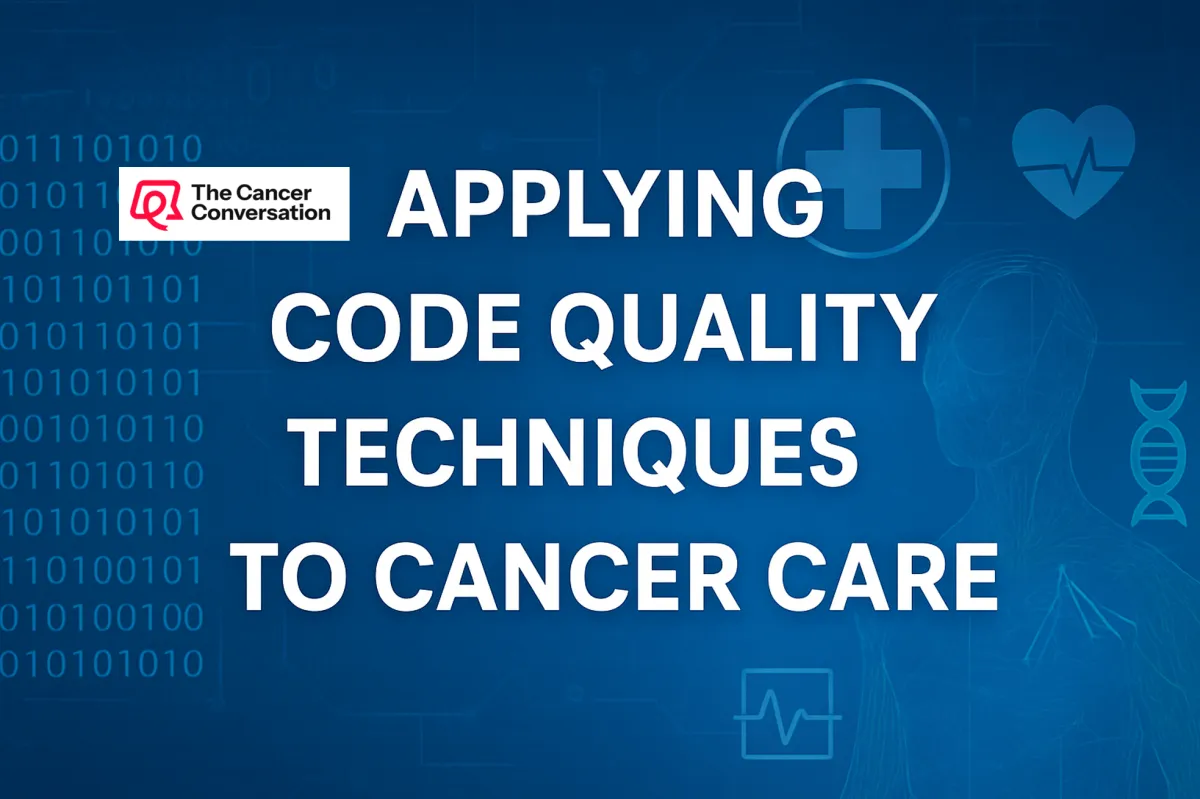
Applying Code Quality Techniques to Cancer Care
In the world of cancer care, finding ways to navigate and manage your health can feel overwhelming. Just as code quality techniques ensure a seamless software experience, similar principles can be metaphorically applied to enhance cancer care and support holistic healing. By incorporating practices that focus on preventive health and mind-body wellness, individuals can take a proactive role in their cancer recovery. This approach not only empowers those diagnosed with cancer but also provides caregivers and loved ones with tools to support their journey. Let's explore how these strategies can bring hope and resilience to your path towards well-being. 🌟 Learn more.
Code Quality Meets Cancer Care
Incorporating code quality techniques into cancer care can help individuals manage their health more effectively. This section explores proactive strategies and the benefits of mind-body wellness.
Proactive Health Strategies
Proactive health strategies can serve as a first line of defense in cancer care. By focusing on preventive health, individuals can take control of their wellness journey. This approach involves regular health check-ups, maintaining a balanced diet, and incorporating physical activity. These steps not only help in early detection but also improve overall well-being.
Schedule regular screenings and medical check-ups.
Incorporate a balanced diet rich in fruits and vegetables.
Engage in regular physical activity, such as walking or yoga.
Early detection can increase treatment success rates. According to this study, proactive health measures can significantly reduce the risk of severe outcomes. By taking these steps, individuals can empower themselves and potentially improve their prognosis.
The Power of Mind-Body Wellness
The mind-body connection plays a crucial role in cancer care. Practices such as meditation and mindfulness can aid in emotional and physical healing. These techniques can help reduce stress, improve mood, and enhance overall health.
Meditation and mindfulness have been linked to lower stress levels and improved immune function. A study found that regular practice can lead to significant health benefits, contributing to a positive outlook on life. Read more about how these practices can support cancer care.
Engaging in mind-body wellness can be as simple as setting aside time each day for meditation or yoga. These activities nurture a sense of calm and foster resilience, aiding in cancer recovery.
Holistic Healing Techniques
Holistic healing encompasses both traditional and alternative therapies to create a comprehensive cancer care plan. This section delves into how these therapies can be integrated and how they empower recovery.
Integrating Traditional and Alternative Therapies
Holistic healing involves bringing together traditional medical treatments and alternative therapies. This integrated approach addresses both physical symptoms and emotional well-being. It allows patients to benefit from the strengths of various methods, providing a more balanced treatment plan.
The ICRP Coding Guidelines emphasize the importance of combining therapies like chemotherapy with acupuncture or nutritional counseling. This combination can enhance treatment efficacy and patient comfort.
By integrating these therapies, patients can experience a more personalized care plan. This strategy empowers individuals to actively participate in their treatment, promoting a sense of agency and hope.
Empowering Your Cancer Recovery
Empowering your cancer recovery involves taking steps to actively engage in your healing process. This empowerment can come from understanding treatment options and engaging in mind-body wellness practices.
Patients who take an active role in their care often report feeling more in control. Exploring various treatment options, including both conventional and complementary therapies, can provide a comprehensive plan tailored to individual needs. Learn more about empowering your cancer recovery through personalized care.
To empower your recovery:
Educate yourself about different treatment options.
Communicate openly with healthcare providers.
Engage in supportive communities for shared experiences.
Tools for Caregivers and Loved Ones
Caregivers and loved ones play a vital role in supporting cancer patients. This section provides tools and strategies to assist in building resilience and offering support.
Supporting the Cancer Journey
Caregivers can significantly influence a patient's cancer journey. Providing emotional and practical support can ease the burden of treatment. Being informed and prepared allows caregivers to offer more effective help.
Ways caregivers can support include:
Offering transportation to medical appointments.
Assisting with daily tasks and routines.
Providing a listening ear and emotional support.
Supporting a loved one through cancer can be challenging, but it is a vital part of their healing process. Engaging with the patient and maintaining open communication can foster a supportive environment.
Building Resilience Together
Building resilience is crucial for both patients and caregivers. By fostering a strong support system, loved ones can help patients navigate the complexities of their cancer journey. Resilience can be nurtured through shared experiences and collective strength.
Creating a network of support among family and friends can provide emotional stability. Encouragement, shared activities, and open communication can contribute to resilience.
To build resilience together:
Encourage open discussions about thoughts and feelings.
Share responsibilities to lighten the load.
Engage in activities that promote relaxation and bonding.
In summary, by applying code quality techniques to cancer care, both patients and caregivers can foster a holistic and supportive healing environment. 🌻








